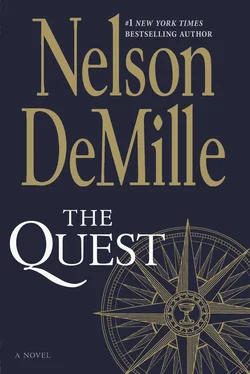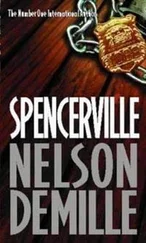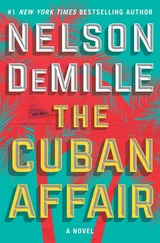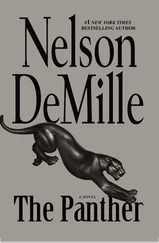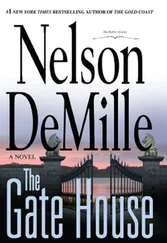Nelson Demille - The Quest
Здесь есть возможность читать онлайн «Nelson Demille - The Quest» весь текст электронной книги совершенно бесплатно (целиком полную версию без сокращений). В некоторых случаях можно слушать аудио, скачать через торрент в формате fb2 и присутствует краткое содержание. Год выпуска: 2013, ISBN: 2013, Издательство: Center Street, Жанр: Триллер, на английском языке. Описание произведения, (предисловие) а так же отзывы посетителей доступны на портале библиотеки ЛибКат.
- Название:The Quest
- Автор:
- Издательство:Center Street
- Жанр:
- Год:2013
- ISBN:1455576425
- Рейтинг книги:5 / 5. Голосов: 1
-
Избранное:Добавить в избранное
- Отзывы:
-
Ваша оценка:
- 100
- 1
- 2
- 3
- 4
- 5
The Quest: краткое содержание, описание и аннотация
Предлагаем к чтению аннотацию, описание, краткое содержание или предисловие (зависит от того, что написал сам автор книги «The Quest»). Если вы не нашли необходимую информацию о книге — напишите в комментариях, мы постараемся отыскать её.
The Quest — читать онлайн бесплатно полную книгу (весь текст) целиком
Ниже представлен текст книги, разбитый по страницам. Система сохранения места последней прочитанной страницы, позволяет с удобством читать онлайн бесплатно книгу «The Quest», без необходимости каждый раз заново искать на чём Вы остановились. Поставьте закладку, и сможете в любой момент перейти на страницу, на которой закончили чтение.
Интервал:
Закладка:
That story, however, would never see the light of day unless or until he went back to Ethiopia to discover the ending. Or, he supposed, it could be published posthumously, with an editor’s epilogue regarding the fate of the author.
Now, Jean, the attractive lady next to him at the bar, was looking through her guidebook and said, “It says here that the Piazza Navona is all decorated for Christmas.”
“I actually walked through there last night. Worth seeing.”
“All right. Campo de’ Fiori?”
“Produce market by day, meat market by night.”
“All right…” She went back to her Roman guidebook, and Purcell went back to his Ethiopian book. The questions raised in his story, and in his mind, were: Who owns a two-thousand-year-old relic? Obviously, whoever has it owns it. But how did the present owner get the object? And does the object, if it is priceless, actually belong to the world?
The other question, of course, had to do with the authenticity of the object. Purcell had no doubt that whatever it was that now sat in the black monastery had no mystical powers, despite Father Armano’s claim that it healed his wound and his soul, whatever that was. But the cup could be authentic in the sense that it was the actual chalice used by Christ at the Last Supper. Or it could be an object of faith, like most religious relics he’d seen in Rome and elsewhere.
He recalled what he’d once seen in the small chapel of Quo Vadis on the Appian Way, outside the gate of the city wall: a piece of black basalt paving stone, in which was a footprint. Specifically, the footprint of Jesus Christ who had appeared to Peter on the Appian road as the saint was fleeing for his life from Rome. Peter, stunned at seeing his risen Lord, blurted, “ Domine, quo vadis? ” Where are you going, Lord? And Christ had replied, “To Rome, Peter, to be crucified for a second time.” And Peter, feeling guilt at fleeing, and understanding what Christ was saying to him, returned to Rome to meet his fate and was crucified.
The story, Purcell understood, was apocryphal, and the outline of a foot in the paving stone was not actually made by Jesus’s size nine sandal. But an Italian friend once said to him about the stone of Quo Vadis, “What is real? What is true? What do you believe?” Quo Vadis?
Well, he thought, maybe he was going back to Ethiopia to be crucified a second time. And that depended on Henry Mercado, who was half an hour late for his date with destiny. Purcell knew he was coming; Mercado had no choice, just as Peter had no choice.
Purcell ordered another Jack Daniel’s and another red wine for the lady. The bar was full-best view in Rome-but the dining tables were almost empty-not the best food in Rome.
Jean, aged about forty, was a blonde Brit, and looked nothing like Vivian, but she made him think of Vivian because she was a woman. She was interesting and interested, and they were both staying at the Forum, alone, and what the hell, it was Christmas in Rome. Coffee and cornetti in bed. A wonderful memory.
She observed, “Your friend is late.”
“He’s always late.”
“He must be Italian.”
“No. But when in Rome.”
She laughed, then informed him, “Did you know that this hotel was once a convent?”
“I’m checking out tomorrow.”
She laughed again and returned to her guidebook.
His mind went back to Addis Ababa. The week at the Hilton after their release from prison had been intense and tense as they waited for news of Henry and Gann, and also waited for a midnight knock on their door, or a call or visit from their respective embassies telling them they were free to leave Ethiopia. That was the tense part. The intense part was their lovemaking, knowing or believing that this was all coming to an end, one way or the other.
He thought that if they’d left it there-if they’d separated at the airport in Cairo, as they said they would-then that would have been the end of it. She’d be with Mercado now, and they’d all be going to London to see Gann. But they had decided to spend a last night together in Cairo at the Grand Nile. Then they found a furnished sublet together.
Cairo, as he knew from previous experience, was not Paris, or London, or Rome; Cairo was a challenge, and whatever romance it had in its streets and its stones was overshadowed by its repressive atmosphere.
Despite that, and despite the rumors of war, and the unpleasant memories of Ethiopia, he and Vivian had had a very good month in Cairo before she announced her departure for Geneva, where she had, she said, business and family.
In retrospect, he should have asked her to be more specific about her plans to return to Cairo, but it never occurred to him that she wasn’t coming back. He had no phone number for her, and the return address on her single letter was a post office box. His reply letter, as he recalled, had been short and not filled with love or longing, or understanding. In fact, he was angry, though that didn’t come through either. This was not the kind of writing he was good at, and his note may have sounded terse and distant. And that was the end of the letters, and presumably the end of the affair. And that was what he’d implied to Mercado, and that was the truth-or the truth as it stood at this time.
Also, in retrospect, he realized that the good news they’d gotten from the British embassy in Cairo-that Henry Mercado was about to be released-had something to do with her departure. He’d had a brief thought that she had left to find Henry, but if that were the case, she’d have told him to his face in Cairo. Vivian was forthright and honest, and brave enough to say, “It’s over. I’m going back to Henry.”
But Vivian knew that despite Henry’s forgiving her for her one-night indiscretion when they thought they were about to be shot, he would not forgive her for her week with Frank Purcell in Addis or for their month together in Cairo. Yet for some reason, she couldn’t stay in Cairo with him after Henry was free. He sort of understood that, but he also understood that she wanted the three of them to be together again, in some fashion or another, and to go back to Ethiopia together.
Jean asked, “Is that your dinner date?”
He looked at the entrance, where Mercado was standing, scanning the bar. Purcell caught his attention, and Mercado headed toward him. Henry still didn’t have a topcoat, and he was wearing what he’d worn last evening, except he’d added a scarf.
They didn’t shake, and Purcell introduced him to Jean, whose last name Purcell didn’t know, along with not knowing her room number. They made small talk for a minute, and Purcell noted that Henry seemed to be in a better mood, and also that Henry could be charming to an attractive lady. He pictured him in the Addis Hilton bar, chatting up Vivian for the first time.
Under normal circumstance Purcell might have asked Jean to join them for dinner, but tonight he needed Henry to himself, without Jean, and without the absent presence of Vivian. He said to Jean, “Try the Piazza Navona tonight.”
Henry suggested, “Trastevere would be better.” He gave her the name of a restaurant.
Jean thanked them and went back to her guidebook.
Purcell led Mercado to a reserved table near the window and they sat.
Mercado said, “I’m not actually staying for dinner. But let’s have a bottle of good wine.”
“Whatever is your pleasure.”
Mercado scanned the wine list, summoned a waiter, and they discussed vino in Italian.
Purcell lit a cigarette and looked out at the city. He never quite understood why Peter, and then Paul, had traveled all the way from their world to Rome, the belly of the beast. Surely they knew that was suicidal.
Mercado said, “You got off easy with a 150,000-lire bottle of amarone.”
Читать дальшеИнтервал:
Закладка:
Похожие книги на «The Quest»
Представляем Вашему вниманию похожие книги на «The Quest» списком для выбора. Мы отобрали схожую по названию и смыслу литературу в надежде предоставить читателям больше вариантов отыскать новые, интересные, ещё непрочитанные произведения.
Обсуждение, отзывы о книге «The Quest» и просто собственные мнения читателей. Оставьте ваши комментарии, напишите, что Вы думаете о произведении, его смысле или главных героях. Укажите что конкретно понравилось, а что нет, и почему Вы так считаете.
